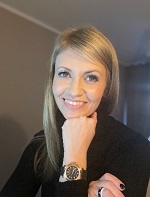Meet the latest RTT Committee Member
I am happy to introduce myself as the latest member of the radiotherapists’ (RTT) committee; after I was invited to become an observer last year I will continue as a member from the spring. This is an exciting opportunity for me to contribute to the committee’s goal of working towards safer radiotherapy and care for patients.
I started my radiotherapy journey in 2008 as a (therapy) radiographer at Tartu University Hospital, Estonia, and I have worked in the same department since. As the radiotherapy-related content of the radiography curriculum in our country is small (3% to be exact), I have travelled along quite a steep learning curve, and first and foremost my experience has shown me how important proper education for RTTs is. In 2021, I graduated from Trinity College Dublin with an MSc in advanced radiotherapy practice and I have attended several courses, fellowships and congresses via the International Atomic Energy Agency and ESTRO. At ESTRO congresses, I have presented research findings and co-chaired sessions. Over the years I have had the opportunity to grow from the position of clinical RTT to that of radiotherapy quality manager, which is my current role in the clinic. I also work as a project coordinator in Tartu University Hospital`s Cancer Centre, where my role is to coordinate the European Union projects. The main focus is on the European Commission`s cancer mission and its goals: patient-centred care, survivorship care, quality of life and the establishment of local and international cancer infrastructure.
Alongside my clinical work, in 2012 I started to teach radiotherapy at Tartu Healthcare College, which is the only educational institution in Estonia that teaches radiographers. At about the same time, there were attempts to launch sustainable, radiotherapy-specific programmes, but these faced numerous obstacles due to the small number of potential students in my country. Yet in 2020 we were able finally to open our college`s international master`s programme in radiotherapy. The goal is to provide hospital departments and the college with specialists who are competent in radiotherapy, management and research and have pedagogical skills to take the lead in the development of services. As the programme is international, we have students from countries in which radiotherapy-specific education is not adequate. The situation around the globe is very diverse. Currently, my main job at the college is to manage and coordinate the MSc programme and to deliver some of the lectures.
I was lucky to be offered another exciting opportunity at the College: to coordinate an international project that is focused on multidisciplinary collaboration in breast-cancer therapy. We have created an open-access, online-learning platform for all interested allied health professionals (such as radiographers and nurses) to deepen their knowledge of breast-cancer treatment and safety, and of the latest approach among professionals of different disciplines.
As radiotherapy is part of a complex treatment pathway for patients, my interest extends beyond the precision and quality of the treatment itself to the patient who is in the middle of the process. I wish to know how to support them in the best possible way. Radiation therapists have a huge responsibility for the treatment, but also the opportunity to improve the patient’s experience. They must be sufficiently educated and encouraged to have the skills, competences and motivation to take on this role.

Siret Kivistik, MSc
Radiation therapist, lecturer, project coordinator
Tartu University Hospital
Tartu Healthcare College
siretkivistik@nooruse.ee